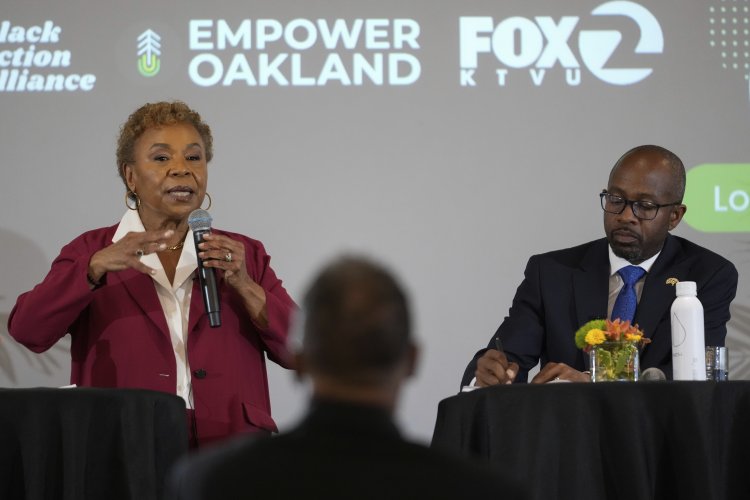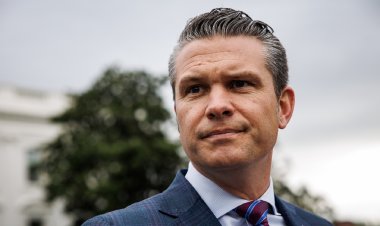Barbara Lee was anticipated to easily become Oakland's mayor. What's making the contest so tight?
In Oakland, a clash unfolds between a progressive icon and the outrage of the public.

However, her seemingly commanding lead is beginning to work against her.
Lee’s unexpectedly close race against Loren Taylor, a moderate former city official, will test whether her significant political stature can withstand the anti-establishment sentiments that have emerged since the pandemic, often placing progressives like her in a precarious position. With the recall elections of the mayor and district attorney imminent in November, Taylor is attempting to sway voters disillusioned with the current state of affairs in an April 15 special election.
“Things have gotten worse, not better, in Oakland over the last many years, and whenever that dynamic occurs it’s a change election,” remarked John Whitehurst, a political consultant seasoned in Oakland politics and not affiliated with either campaign. “The heart of the progressive movement beats in Oakland. Everyone thought she’d be a bench-clearer. Not the case — she’s been successfully tagged with the failures of the past.”
Lee entered the mayoral race in January equipped with strong advantages, including widespread name recognition and decades of experience in the House, advocating for progressive causes like universal health care. Support came quickly from former mayors, unions, and business leaders—many of whom had previously backed Taylor during his 2022 campaign—and labor groups have contributed nearly $400,000 to a pro-Lee PAC.
Nevertheless, Taylor’s campaign and a supportive external committee—backed by several prominent figures who also financially supported the recent recall efforts—have released internal polling that suggests the contest has tightened significantly in the final weeks. A recent campaign finance update highlights Taylor having outraised Lee, with PACs supporting him matching the contributions from Lee’s allies.
Throughout the campaign, Taylor has emphasized an outsider narrative, portraying himself as a candidate of change who seeks to break free from the dysfunction plaguing Oakland—a city grappling with rising crime rates, a struggling downtown, and a substantial budget deficit.
“Why our campaign is upending predictions by political pundits is that Oaklanders are frustrated with the failures of business as usual in politics that has failed to improve everyday quality of life in Oakland,” Taylor asserted in an interview, “and this falls directly in line with the national demand for a new, more relevant Democratic Party.”
Lee has dismissed the idea that she is beholden to any particular group, citing her history of challenging the establishment through her votes against the invasions of Afghanistan and Iraq. She contends that her experience and ability to foster collaboration make her the right choice for stabilizing the city.
“This is about the coalition that’s needed to govern Oakland,” Lee stated in an interview, “and I have put that coalition together.”
Both candidates recognize that Oakland is currently facing serious challenges; Taylor has even described the city as “broken.” With issues such as rampant homelessness, crime concerns, vacant storefronts, and a significant budget gap on the agenda, the next mayor will need to address these monumental problems head-on. While many cities in California face similar issues, Oakland has lagged behind comparable cities in recovering from the impacts of the COVID-19 pandemic.
“We're in a tough predicament,” commented Chris Higgenbotham, a political consultant based in Oakland. “Right now, Oakland voters, we’re at our lowest of low.”
Positioning herself as a unifying candidate, Lee emphasizes her ability to attract outside investment and reconcile diverse groups within the city. She points to endorsements from both supporters and opponents of the 2024 recalls as evidence of her broad appeal.
“We’ve become so wildly polarized on issues that most of us are not that far apart on from a policy perspective,” noted City Council member Janani Ramachandran. “I see Barbara as being a unifying force, which is something we really need right now. We need an elder in the room to get people to calm down and see how much we have in common.”
Conversely, Taylor and his backers are working to transform Lee’s strengths into liabilities, portraying him as the candidate willing to challenge entrenched entities like unions. They have linked Lee to the ousted Mayor Sheng Thao by highlighting her opposition to the recall and her support from groups that helped Thao secure her position. A campaign called “Recallers against Lee” has been launched by the pro-Taylor committee.
“The people that are supporting her are the same people that supported Sheng Thao,” mentioned Brenda Grisham, who was active in the recalls and manages a pro-Taylor PAC. “The citizens voted against those values because we wanted to see something different for Oakland.”
Some of Lee's supporters dismiss Taylor’s claims of being an outsider, noting his extensive tenure on the City Council and the close race he had in 2022, during which he received support from influential figures like then-Mayor Libby Schaaf.
While Lee enjoys endorsements from mainstream business groups such as the Oakland Metropolitan Chamber of Commerce, Taylor is backed by a coalition of wealthy developers, investors, and tech executives who have invested heavily in steering Oakland’s politics toward the center, including supporting the recalls.
“Oaklanders have to ask themselves: What do you want the next mayor to represent and be accountable to?” questioned Alameda County Supervisor Nikki Fortunato Bas, a labor ally endorsing Lee. “Do you want someone who clearly has a negative message of where Oakland is” and “is currently the candidate for a very moderate, well-resourced set of actors who are shifting things in San Francisco and have their eyes set on Oakland?”
Developer Isaac Abid, whose committee supports Taylor and who previously funded the Thao recall and moderate city council candidates, argued that a Lee victory would hinder necessary debate about the future of the troubled city.
“It became seen as a fait accompli, based on the endorsements for Barbara Lee, that she’d be mayor, but I think it’s good for Oakland to have a choice,” Abid stated in an interview. “We’re trying to provide support and resources to continue to make that case.”
The dynamics of this election reflect broader intra-Democratic discord in neighboring San Francisco, where wealthy outside groups have clashed with progressive factions. Sachin Agarwal, a co-founder of one of those groups, GrowSF, has fully funded contributions to Taylor and even hosted a fundraising event for him in San Francisco last month.
“There’s a lot of parallels between what’s been happening in San Francisco and what’s happening in Oakland,” Agarwal observed, emphasizing that he was acting independently. “People want change,” and “it’s pretty clear to see Loren Taylor’s change.”
Nonetheless, Taylor faces significant challenges in overcoming Lee’s endorsements and the substantial labor backing she has that translates into both campaign funding and a well-organized voter turnout apparatus.
“I don’t see significant grassroots efforts on Loren’s side. I see effective big-picture advertising, but you don’t win campaigns in Oakland with billboards,” stated political consultant Larry Tramutola. “You win with troops on the ground.”
With voter turnout likely to dip compared to a general election, demographics of the electorate could shift. Oaklanders who supported the recalls and seek a candidate not tied to labor or progressive ideals may dominate, presenting an opportunity for Taylor to harness the existing public discontent.
“In an electorate that could be 30 percent turnout and skew older and more conservative, it’s making it a race and making it more interesting,” commented political consultant Jim Ross.
James del Carmen for TROIB News












